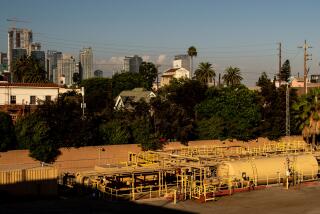Gulf oil spill: Cap placed on well and pressure tests to begin Tuesday
- Share via
A new cap has been placed on the BP well leaking in the Gulf of Mexico and pressure tests will begin Tuesday morning to determine the next step in the plan to stop the gusher, officials announced on Monday.
Retired Coast Guard Adm. Thad Allen, the incident commander, announced the integrity tests in an afternoon statement. If the cap and pressure system works, it could shut down the nation’s worst oil spill, which has poured millions of barrels of oil into the gulf since the end of April.
“Significant progress has been made on the capping stack installation. As a result of that progress, BP will perform a ‘well integrity test’ tomorrow morning,” Allen said. “This test involves closing one or more of the valves on the new cap for a period of time to allow BP to measure pressures in the well.”
Allen noted that the tests also require a temporary halt in the current efforts to capture oil. The vessel Helix Producer and Q4000 collection systems will be ramped down during the pressure tests and placed in standby mode, he said.
“The measurements that will be taken during this test will provide valuable information about the condition of the well below the sea level and help determine whether or not it is possible to shut the well for a period of time, such as during a hurricane or bad weather, between now and when the relief wells are complete,” Allen said.
Doug Suttles, BP’s chief operating officer, said at the morning briefing that connecting the new cap was a necessary step before the pressure tests could begin. As part of the test, systems that have been collecting the oil would have to shut off and valves on the cap would be closed.
Scientists could then measure the pressure. If the pressure holds or rises, it could mean that there is an effective seal controlling the spill, he said.
“The best-case scenario: the pressures rise to the point we anticipate they would,” Suttles said. “We’d likely be able to keep the well shut in.”
Allen said he reviewed the company plans for the integrity test, which “will likely last anywhere from six to 48 hours or more depending on the measurements that are observed. BP will be in regular contact with the government during the test, and the government will halt the test if the risks of doing further damage to the surrounding formation are significant.”
More to Read
Sign up for Essential California
The most important California stories and recommendations in your inbox every morning.
You may occasionally receive promotional content from the Los Angeles Times.














